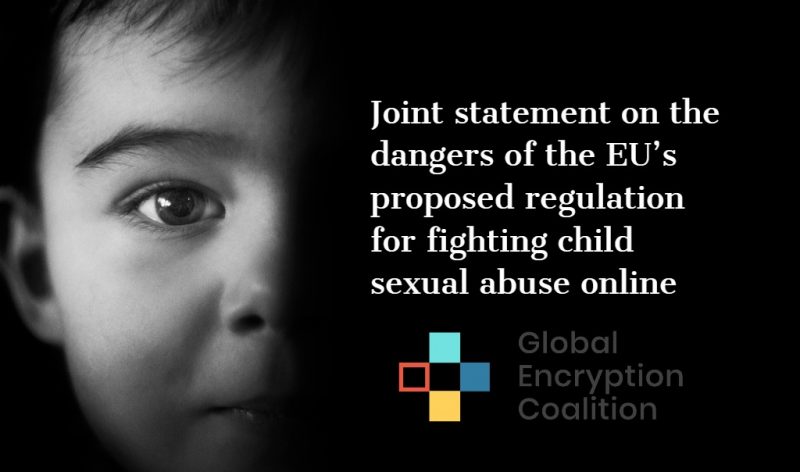Global Encryption Coalition aponta inconsistência no Regulamento de Abuso Sexual Infantil proposto pela Comissão Europeia
9 de junho de 2022Segundo o European Digital Rights EDRi, a Comissão Europeia deve defender a privacidade, a segurança e a liberdade de expressão retirando nova lei: Regulamento CSA
O Centro para Democracia e Tecnologia (CDT) divulgou uma análise inicial do Regulamento de Abuso Sexual Infantil proposto pela Comissão Europeia, emitido em maio. Initial analysis of the European Commissions’s proposed Child Sexual Abuse Regulation
Como apontamos na análise, o Regulamento CSA proposto é fundamentalmente inconsistente com a criptografia de ponta a ponta, porque exige que os provedores verifiquem o conteúdo do usuário em busca de imagens CSA conhecidas e desconhecidas e para conversas de “preparação” de CSA.
Para exercer tal atividade, o provedor deve ter acesso ao texto das comunicações que realiza em seu serviço; provedores de serviços E2EE não têm esse acesso.
Levantamos outras objeções ao Regulamento CSA proposto, incluindo a forma como ele prevê o acesso governamental sem garantia às comunicações, bem como o impacto negativo que terá sobre os direitos de liberdade de expressão.
Além disso, a European Digital Rights (EDRi) está circulando uma carta de assinatura pedindo a retirada do Regulamento CSA proposto devido ao seu impacto, entre outras coisas, na criptografia.
Como a EDRi aponta na carta, o Regulamento CSA proposto na verdade coage a própria conduta invasiva de privacidade que as instituições europeias questionaram: cria um regime no qual os provedores de serviços de comunicação são incentivados a escanear e controlar o que seus usuários dizem online, capacitando as plataformas e enfraquecendo os direitos de seus usuários.
A EDRi divulgou a carta com 73 signatários (incluindo CDT) e está mantendo a carta aberta por mais duas semanas para trazer signatários adicionais.
Quarenta entidades adicionais já assinaram e a carta ficará aberta para assinatura por mais algumas semanas.
A EDRi encorajou a CDT a distribuir a carta aos membros da Global Encryption Coalition para sua consideração e apontou que ter organizações da sociedade civil e grupos profissionais de todo o mundo assinando a carta seria particularmente útil porque as instituições na Europa estão atentas a essas vozes.
Apenas CSOs e grupos profissionais (sem empresas) podem se inscrever.
Você pode ler a carta EDRi sobre o Regulamento CSA proposto e assiná-la aqui.
Perguntas sobre a carta EDRi podem ser endereçadas a Ella Jakubowska copiada acima.
Esperamos que a proposta de CSA da CE seja um fluxo de trabalho significativo para a Coalizão Global de Criptografia para o próximo ano.
Seria bom para os membros do GEC se atualizarem mais cedo.
The Center for Democracy & Technology (CDT) has released an initial analysis of the European Commissions’s proposed Child Sexual Abuse Regulation issued in May.
As we point out in the analysis, the Proposed CSA Regulation is fundamentally inconsistent with end-to-end encryption because it requires providers to scan user content for known and unknown CSA images, and for CSA “grooming” conversations.
To engage in such activity, the provider must have access to the text of the communications it carries on its service; providers of E2EE services do not have such access.
We raise other objections to the Proposed CSA Regulation, including the way it envisions warrantless governmental access to communications as well as the negative impact it will have on free expression rights.
In addition, European Digital Rights (EDRi) is circulating a sign-on letter calling for withdrawal of the Proposed CSA Regulation because of its impact, among other things, on encryption.
As EDRi points out in the letter, the Proposed CSA Regulation actually coerces the very privacy invasive conduct that European institutions have called into question: it creates a regime in which communication service providers are encouraged to scan and control what their users say online, empowering the platforms and weakening the rights of their users.
EDRi released the letter with 73 signatories (including CDT) and is holding the letter open for two additional weeks to bring on additional signatories.
Forty additional entities have already signed on and the letter will be held open for signature for a couple of more weeks.
EDRi encouraged CDT to circulate the letter to the members of the Global Encryption Coalition for their consideration and pointed out that having civil society organisations and professional groups from across the globe subscribe to the letter would be particularly helpful because institutions in Europe are attentive to such voices.
Only CSOs and professional groups (no companies) can subscribe.
You can read the EDRi letter on the Proposed CSA Regulation and sign onto it here.
Questions about the EDRi letter can be addressed to Ella Jakubowska copied above.
We expect the EC’s CSA proposal to be a significant work stream for the Global Encryption Coalition for the next year or so.
It would be good for GEC members to get up to speed on it early.

Global Encryption Coalition aponta inconsistência no Regulamento de Abuso Sexual Infantil proposto pela Comissão Europeia
Segundo o European Digital Rights EDRi, a Comissão Europeia deve defender a privacidade, a segurança e a liberdade de expressão retirando nova lei: Regulamento CSA.
About GEC

The Global Encryption Coalition promotes and defends encryption in key countries and multilateral fora where it is under threat. It also supports efforts by companies to offer encrypted services to their users.
However, some governments and organisations are pushing to weaken encryption, which would create a dangerous precedent that compromises the security of billions of people around the world.
The Global Encryption Coalition (GEC) was founded in 2020 by the Center for Democracy & Technology, Global Partners Digital and the Internet Society and now has over 200 members.
Its mission is to promote and defend encryption in key countries and multilateral fora where it is under threat. The GEC also supports efforts by companies to offer encrypted services to their users.
Combate à pornografia infantojuvenil com aperfeiçoamentos na identificação de suspeitos – Parte I
INTERNATIONAL NEWS
Crypto ID publishes international articles about information security, digital transformation, cyber security, encryption and related topics.
Please check here!

